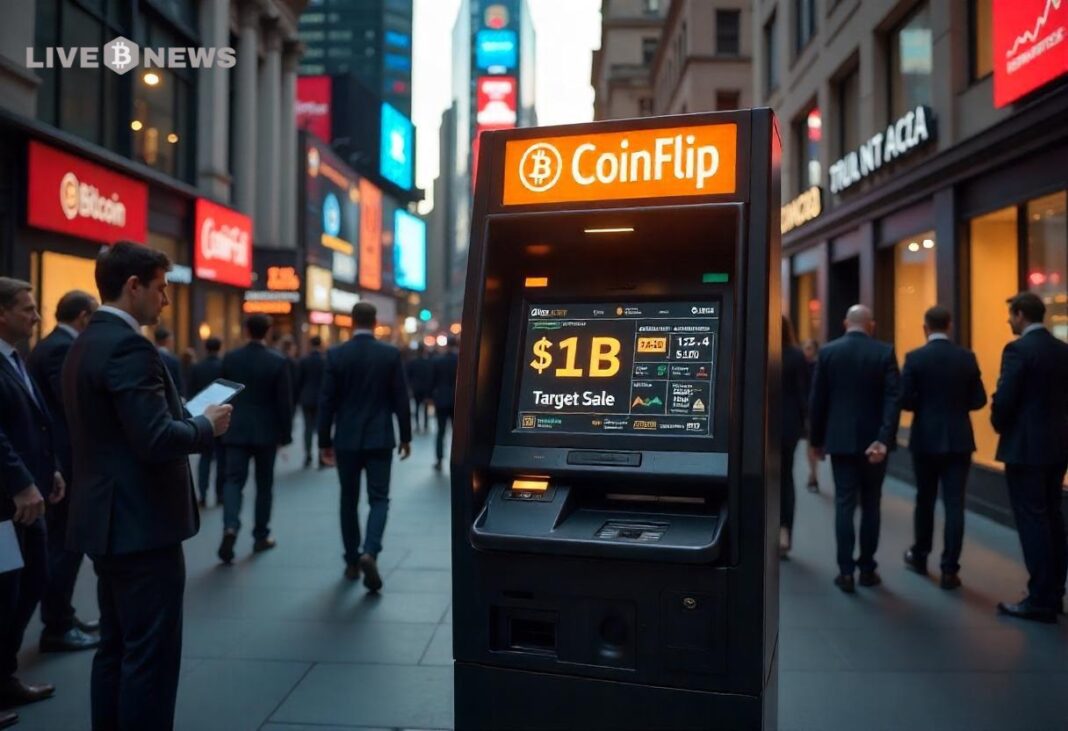- CoinFlip, a leading Bitcoin ATM operator, seeks a $1 billion sale.
- Regulatory pressures and market consolidation drive CoinFlip’s strategy.
CoinFlip, a Bitcoin ATM operator located in Chicago, is considering a one-billion dollar target value sale. The 2015-founded firm has over 5,500 bitcoin ATMs across ten nations, including the U.S., Mexico, and Australia. The crypto ATM industry is faced with increased regulatory scrutiny and market consolidation, and this move comes in response to that.
Financial advisors have also been hired by the firm to gauge potential buyer interest, which remains in the early stages. A successful sale is not assured, but it could change the competitive playing field in the crypto ATM space.
Regulatory and Market Pressures Drive Strategic Move
There are many challenges that have arisen in this industry, specifically with crypto ATM, including high operational costs and stricter regulations. Cryptocurrency prices are notoriously volatile, and compliance demands have put a squeeze on smaller operators, with nearly 40,000 Bitcoin ATMs on the world’s streets. The pressure to reap CoinFlip’s market dominance is a strategic response that could result in its sale.
If CoinFlip is acquired by a buyer with technological capabilities or regulatory expertise, it can be a position-strengthening for CoinFlip. This is showing the company’s growth ambitions by expanding into South Africa and New Zealand, which makes it an attractive acquisition.
CoinFlip’s Growth and Industry Context
Since its inception, CoinFlip has grown quickly to become the largest Bitcoin ATM provider in the United States. Users can buy and sell cryptocurrencies with cash or debit cards, bridging the traditional finance and digital assets. It has more than 5,600 machines worldwide and is the second biggest operator in the world.
Yet with more of the wider cryptocurrency market returning to life, the prices of Bitcoin are rising towards $105,000 in early 2025. As this rally has been growing, so has interest in the crypto infrastructure like ATMs, as there’s growing demand for on-ramps. The industry, however, faces its own challenges in the form of regulatory hurdles, such as Iowa suing CoinFlip and Bitcoin Depot for encouraging fraud, which eventually led to losses.
Those wanting to increase physical crypto access points, as crypto is becoming mainstream, may also find the sale of CoinFlip appealing. Moreover, it might be a sign of further fragmentation of the target market as larger market players try to consolidate it.
That sale is something that the company’s leadership views as a means to bolster its position in a competitive landscape. A deal that works could pay for technological upgrades or compliance improvements, for example, in response to industry pain points. However, as the crypto ATM market continues to take shape, the steps that CoinFlip will take next will likely dictate the course the industry takes.



